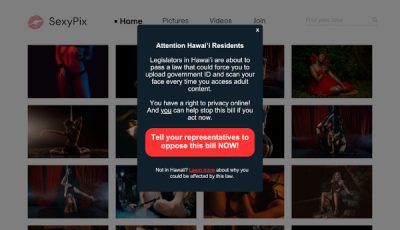FSC: Adult Industry Being Wrongly ‘Red Flagged’ Under FinCEN Guidance
 WASHINGTON, D.C. – In an official Statement for the Record to the House Committee on Financial Services (HFSC), the Free Speech Coalition (FSC) told the Committee that while FSC “strongly support(s) efforts to safeguard the financial system,” certain guidance from the Department of Treasury’s Financial Crimes Enforcement Network (FinCEN) has “unintentionally resulted in banks mistaking the routine transactions of legal adult businesses for ‘red flag’ indicators of human trafficking.”
WASHINGTON, D.C. – In an official Statement for the Record to the House Committee on Financial Services (HFSC), the Free Speech Coalition (FSC) told the Committee that while FSC “strongly support(s) efforts to safeguard the financial system,” certain guidance from the Department of Treasury’s Financial Crimes Enforcement Network (FinCEN) has “unintentionally resulted in banks mistaking the routine transactions of legal adult businesses for ‘red flag’ indicators of human trafficking.”
The statement was provided to the HFSC following a February 14 FinCEN oversight hearing held by the Committee. During the hearing, “Rep. Joyce Beatty (D-OH) called on FinCEN officials to explain what steps they were taking to minimize the debanking of legal businesses and workers,” as FSC put it in announcing their submission of the official statement.
“Beatty’s question isn’t the first time this issue has been raised in Congress,” FSC noted in the announcement. “In November, during a Senate Banking Committee hearing, Sen. Laphonza Butler (D-CA) asked officials at the Office of the Comptroller of the Currency what steps it was taking to ensure that financial institutions were not ‘unintentionally or intentionally closing the accounts of customers who were engaged truly in lawful activities.’”
In the statement submitted to the HFSC, FSC noted that the work the adult industry does “is legal in all 50 states.”
“Our members pay taxes, keep detailed records of those with whom we work, and adhere to a code of ethics,” FSC added in the statement. “We are made up of retail stores, production companies, technology platforms, product manufacturers, educators and independent models and creators. But no matter what we do, or where we work, we face financial discrimination. Even the FSC — a 501(c)6 non-profit with no relationship to production, manufacture, or distribution — has been unable to secure a secondary banking account for over three years.”
FSC asserted it is vital that efforts to safeguard the financial system are carried out in “a manner that does not limit or eliminate small business owners’, employees’, workers, consumers’, and vulnerable populations’ access to reliable banking services.”
“Currently, however, many individuals and industries are prevented from accessing or are expelled altogether from financial services unintentionally due to banks’ overly broad interpretation of FinCEN guidance around ‘high risk’ activities,” FSC noted. “Banks routinely point to such guidance and specifically, Suspicious Activity Report filings, as justification for closing accounts and cutting off access to reliable banking services despite federal laws providing no authority for account cancellations under these conditions. It is clear that banks have come to the conclusion that in light of unclear guidance from FinCEN, it is easier to deny services to FSC members.”
In the statement, FSC added that it believes two bits of guidance from FinCEN – a September 14, 2014 “Advisory Guidance on Recognizing Activity that May be Associated with Human Smuggling and Human Trafficking – Financial Red Flags” and a subsequent October 15, 2020 “Supplemental Advisory on Identifying and Reporting Human Trafficking and Related Activity” – have “unintentionally resulted in banks mistaking the routine transactions of legal adult businesses for ‘red flag’ indicators of human trafficking.”
In the statement, FSC noted it has now met with “over 40 bipartisan congressional leaders and is dedicated to continue working with Congress, FinCEN, and the federal banking agencies to appropriately address these concerns, to clarify that law-abiding workers in the adult industry do not pose increased regulatory or financial risk, and to fight human trafficking.”
“We do not believe that FSC member activities pose any unusual risk to the financial services sector and have seen no evidence as such,” FSC added. “Further, we are a strong partner with law enforcement in efforts to eradicate illegal activity including human trafficking and believe that having proceeds of legal businesses in the regulated banking system is a strong component of separating legal from illegal activities.”
You can read the full FSC statement submitted to the HFSC here.













